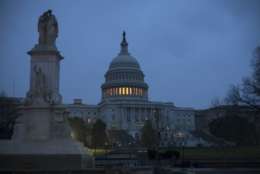Mike Causey
-
Depending on which experts you ask, federal civil servants are either paid 30-plus percent more than the average private sector employee, or 30-plus percent less.
August 21, 2018 -
If you go by averages the stock market is long overdue for a major correction — at least 20 percent, maybe 30 percent or more. During the Great Recession it was down almost 40 percent.
August 20, 2018 -
Thanks to their Civil Service Retirement System and Federal Employees Retirement System annuities, most federal-postal workers are in good shape compared to many of their private sector counterparts.
August 17, 2018 -
People who say it is next to impossible to fire a federal worker should study — and then maybe rejoice in — the Hatch Act, a much-amended 1940s law designed to keep career federal and postal workers from engaging in partisan political activity on the job.
August 16, 2018 -
Financial planner Arthur Stein offers his insight on how to get the most out of your TSP on this week's episode of Your Turn with Mike Causey.
August 15, 2018 -
Financial planner Arthur Stein has many clients who are TSP investors, even several TSP millionaires. He offered advice in today's guest column.
August 15, 2018 -
Financial planner Arthur Stein cautions against investing too much of your TSP in the G fund, because of inflation and taxes. You don’t want to see the purchasing power of your TSP account eaten up over time.
August 14, 2018 -
With two months to go in the inflation-catch-up countdown, the tens of millions who receive civil service benefits, military retired pay or Social Security are currently at the 2.71 percent level.
August 13, 2018 -
Are you retiring at the first opportunity? Or are you planning to work extra because you like the job or your coworkers and want to build your annuity?
August 10, 2018 -
Many experts say that the current bull market began in March 2009 and if it lasts through this month it will be the longest in history. Others say it didn’t start until much, much later.
August 09, 2018 -
Federal News Radio reporters Nicole Ogrysko and Jory Heckman join host Mike Causey on this week's Your Turn to discuss what’s happening and not happening with pay, shutdowns and appropriations on Capitol Hill.
August 08, 2018 -
If the surprise pay raise approved by the Senate makes it through the White House, what would it put in your wallet? We're looking at what’s happening and not happening with pay, shutdowns and appropriations on Capitol Hill.
August 08, 2018 -
Instead of "essential" and nonessential," the labels “emergency” and “nonemergency”are being used more to describe which feds have to work in the event of a government shutdown, whether from bad storms or blustering in the White House
August 07, 2018 -
Today the House is in recess until after Labor Day. Proposed changes in FERS, which would require you to pay 6 percent more for the benefit while cost of living adjustments would be eliminated for retirees, seem less urgent.
August 06, 2018 -
With a possible governmentwide shutdown just 58 days away, survivors of previous time-outs are remembering how they coped, if they were ordered not to work, or to go to work without the guarantee of getting paid.
August 03, 2018















